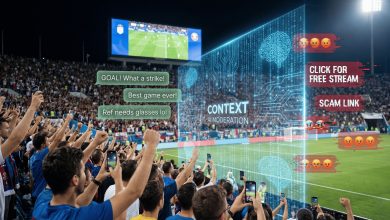Artificial intelligence has rapidly transformed industries all over the globe, revolutionising everything from healthcare diagnostics to financial forecasting.
In medicine, AI algorithms are being utilised to analyse mammograms to detect cancerous tumours that can’t be seen by the human eye.
In the world of industry, machine learning is being optimised to reduce waste and streamline manufacturing processes.
As a final example, AI algorithms are being used by social media and entertainment companies to curate our feeds and keep us fully engaged for as long as possible.
How though, is AI impacting the world of modern-day sports? Is it being used to mastermind tactical innovations on the soccer field? Perhaps not, although we wouldn’t put it past Pep Guardiola to try something like that.
Could it be used to analyse the latest NBA odds and predict the best bets ahead of the on-court action? Perhaps, but we wouldn’t trust it with our money.
In the world of sports, AI is being used in more subtle ways, one of which is sports science. In this article we take a look at how the biggest craze in the digital world is changing and helping sports scientists.
Augmenting Performance Analysis
The temptation to write ‘revolutionising’ in that heading was real and palpable, but to have done so would be disrespectful to sports scientists. For decades, dedicated teams of sports scientists around the globe have been recording and analysing data on the athletes that they coach.
What AI has done though, is aid in this process by enabling professionals to monitor hundreds of data points. Data points that would have taken hours and hours (sometimes days and days) to record and interpret.
This allows sports scientists to spend more time developing programmes, and, most importantly, it allows them to spend more actual time with their athletes.
Interpreting Data
The human brain is effectively a pattern recognition tool with enormous processing power, a huge amount of memory and the extra ingredient of emotion. Whilst AI will never be able to fully replicate that, what it can do is pattern recognition and it can do it at a scale that the human brain could never achieve.
In sports science, this is a phenomenal tool. Data that has been collected over decades can be fed into AI along with the results. For example, training plans, biomechanical stress patterns, ground reaction forces and muscle activation patterns for an individual athlete could be fed into an AI system along with the players injury record.
Through machine learning, the AI could begin to recognise the patterns that tend to lead to injuries for the specific player in this example. It could also then use this data to predict the next injury and recommend steps to minimise the risk of a recurrent injury.
This is one of the key roles of a sports scientist, but with their insane data processing abilities, AI have the upper hand on humans.
Will AI Take Sports Scientists Jobs?
Yes. Absolutely. If you’re shocked at that answer, it’s because most experts and media outlets choose to respond with a wishy-washy answer that obfuscates the truth. Something along the lines of, ‘oh no, it will just make everyone’s jobs easier’, but that’s not the case.
Sport is a business and just like any other business, it runs on the baseline principle of profit. The only way to drive profit is by increasing revenues and reducing costs and, unfortunately for sports scientists, the incorporation of AI feeds into the principle of reducing costs.
Why employ a team of a dozen data analysts when AI can significantly lighten the load? Why pay a large team of people to develop training plans when AI can help and see the organisation reduce its staff by half?
That’s not to say that AI will make the career of sports science obsolescent. There will of course, still be plenty of room for sports scientists who are needed in face-to-face roles, and for those to control and utilise the AI, but in the main, the adoption of AI will lead to a significant reduction in jobs in the sector.
This prediction isn’t hyperbole either, it’s a highly likely outcome based on all of the available evidence that we have from a range of different sectors, all across the globe. In the UK for example, a report analysing the number of jobs already lost to AI – tens of thousands – predicts that 8 million jobs will be lost in the country by the end of the decade.
But on the positive side, ChatGPT makes a lot of cool photos and videos…




